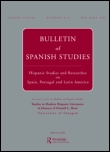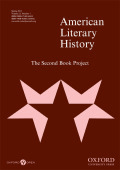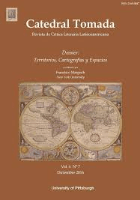
Cuadernos de Ilustracion y Romanticismo
Scope & Guideline
Exploring the Enlightenment and Romanticism's Lasting Impact
Introduction
Aims and Scopes
- Literary Analysis of the Enlightenment and Romantic Periods:
The journal emphasizes critical studies of literature produced during the Enlightenment and Romanticism, examining texts, authors, and literary movements in Spain and their influence on modern thought. - Cultural and Historical Contextualization:
Research often includes the cultural, social, and political contexts in which Spanish literature was produced, linking literary works to historical events and societal changes. - Exploration of Gender and Identity:
There is a significant focus on gender studies and identity politics within literature, exploring how these themes manifest in the works of male and female authors from the Enlightenment to Romanticism. - Transnational Perspectives:
The journal also addresses the transnational influences in literature, examining how Spanish literature interacts with and is shaped by other European literatures, particularly during periods of cultural exchange. - Archival Research and Textual Editions:
Many publications include critical editions of unpublished or lesser-known texts, archival research, and historical studies that contribute to the understanding of the literary canon.
Trending and Emerging
- Interdisciplinary Approaches:
There is a growing trend towards interdisciplinary studies that combine literature with fields such as history, sociology, and cultural studies, enhancing the depth of literary analysis. - Cultural Transfers and Transnationalism:
Recent articles increasingly explore the cultural exchanges between Spain and other countries, particularly during the Romantic period, highlighting how these interactions shaped literary production. - Environmental and Ecological Perspectives:
Emerging themes include explorations of nature and the environment within literary contexts, reflecting a broader global interest in ecological criticism and sustainability. - Postcolonial and Decolonial Studies:
There is an increasing focus on postcolonial perspectives, examining Spain's colonial past and its impact on literature, identity, and cultural narratives in both Spain and Latin America. - Digital Humanities and New Media:
The journal is beginning to incorporate discussions surrounding digital humanities, including how new technologies influence literary studies and the dissemination of literature.
Declining or Waning
- Focus on Traditional Literary Forms:
There appears to be a waning interest in traditional forms of literature such as neoclassical poetry and drama, as newer methodologies and contemporary themes gain traction. - Historical Narratives with Limited Scope:
While historical context remains important, there is a decline in works that focus solely on narrow historical narratives without broader cultural implications, signaling a shift towards interdisciplinary approaches. - Static Gender Discourse:
Although gender studies have been a core area, there is a reduction in discussions that do not engage with contemporary feminist theories, indicating a move towards more dynamic and intersectional analyses. - Regional Studies with Narrow Focus:
Studies that concentrate strictly on regional literature without connecting to broader national or transnational frameworks are becoming less common, as scholars seek to contextualize regional works within larger narratives.
Similar Journals

Studia Aurea-Revista de Literatura Espanola y Teoria Literaria del Renacimiento y Siglo de Oro
Celebrating the Golden Age of Spanish Literary ThoughtStudia Aurea-Revista de Literatura Espanola y Teoria Literaria del Renacimiento y Siglo de Oro, published by the esteemed Universitat Autònoma de Barcelona, stands as a pivotal academic resource in the fields of Literature and History, specializing in Spanish literature from the Renaissance and the Golden Age. With its Open Access model established since 2007, this journal ensures that groundbreaking research is readily available to scholars and enthusiasts worldwide. Notably recognized for its quality, in 2023 it achieved Q1 rankings in both History and Literature and Literary Theory, reflecting its significant contribution to advancing knowledge in these domains. The journal's Scopus rankings further underscore its impact, placing it in the top 20% for literature and the top 37% for history. As it converges from 2018 to 2023, Studia Aurea continues to facilitate critical discussions, innovative research, and the exploration of literary theories, making it an essential platform for researchers, professionals, and students alike.

STUDI FRANCESI
Unveiling the Depths of Cultural NarrativesSTUDI FRANCESI, published by Rosenberg & Sellier, is an esteemed journal in the fields of Cultural Studies, History, and Literature and Literary Theory. With an ISSN of 0039-2944, this journal has been a significant contributor to scholarly discourse since its inception in 1967. Operating from Turin, Italy, STUDI FRANCESI aims to explore and critical analyze the interplay between culture, literature, and historical context, reflecting diverse methodologies and perspectives that shape our understanding of the humanities. Despite being classified in Q4 quartiles according to the latest metrics, it offers a unique platform for emerging voices and innovative research, thus serving both seasoned academics and new researchers keen to delve into the nuances of Italian and European cultural heritage. Journals of this caliber are crucial for fostering academic dialogue and expanding the frontiers of knowledge, making it an invaluable resource for students, professionals, and scholars alike.

Journal for the Study of Judaism
Connecting Past and Present in Jewish StudiesJournal for the Study of Judaism, published by BRILL, serves as a vital platform for scholarly discourse in the fields of History, Literature and Literary Theory, and Religious Studies. With a commendable impact factor and ranking in the Q2 and Q3 quartiles across its respective categories, this journal facilitates high-quality research that explores the multi-faceted dimensions of Jewish studies from its inception in 1970 to the present day. For those who engage with the journal, the commitment to rigorous peer-review processes ensures publication of significant articles that advance knowledge and foster discussions within the academic community. As an essential resource for researchers, professionals, and students alike, the journal continues to enrich the understanding of Judaism through esteemed contributions of scholarship and critical analysis. The journal’s rich legacy and commitment to excellence make it an indispensable tool for those seeking to deepen their insight into Jewish studies and its broader implications.

DAPHNIS-ZEITSCHRIFT FUR MITTLERE DEUTSCHE LITERATUR
Advancing Scholarship in Literary HeritageDAPHNIS-ZEITSCHRIFT FUR MITTLERE DEUTSCHE LITERATUR, published by EDITIONS RODOPI BV, is a distinguished journal dedicated to the exploration and critical analysis of Middle German literature, offering scholars a dedicated platform to contribute to the field. With an ISSN of 0300-693X and an E-ISSN of 1879-6583, the journal has established itself as a vital resource for researchers and students alike, fostering academic discourse and advancing scholarship in literature and literary theory. Operating from the Netherlands, DAPHNIS holds a notable position in the academic community, currently categorized in the Q3 quartile of literature and literary theory, ranked in the 59th percentile among its peers on Scopus. The journal’s commitment to promoting critical insights and comprehensive studies makes it an essential reference point for anyone engaged in the literary academic landscape. While it is not currently open access, access options are available through institutional subscriptions, ensuring that valuable research is disseminated widely. For contributors and readers, DAPHNIS is not just an academic journal; it is a collaborative space where scholarship meets creativity, enriching the understanding of the rich tapestry of Middle German literature.

Bulletin of Spanish Studies
Navigating the Complexities of Spanish Linguistics and LiteratureBulletin of Spanish Studies is a prominent academic journal dedicated to the exploration and discourse of Spanish studies within the diverse realms of Cultural Studies and Literature and Literary Theory. Published by Routledge Journals, Taylor & Francis Ltd, this journal serves as a crucial platform for scholars, researchers, and students to disseminate their findings and engage in scholarly debates related to Spanish literature, culture, and linguistics. With an emphasis on high-quality, peer-reviewed research, the journal holds a reputable Q3 ranking in Cultural Studies and a commendable Q2 ranking in Literature and Literary Theory, reflecting its significant impact within the academic community. The Bulletin is indexed in notable databases, achieving a rank of #314 out of 1106 in Literature and Literary Theory and #738 out of 1304 in Cultural Studies, signaling its vital role in advancing knowledge in these fields. Although it does not currently offer open access options, the journal remains an essential resource for those passionate about the study of Spanish culture and literature from 2010 to 2024 and beyond.

Dirasat Hispanicas-Revista Tunecina de Estudios Hispanicos
Exploring the Rich Tapestry of Hispanic StudiesDirasat Hispanicas-Revista Tunecina de Estudios Hispanicos is a pivotal academic journal published by UNIV TUNIS MANAR, INST SUPERIEUR SCIENCES HUMAINES TUNIS, dedicated to the exploration and analysis of Hispanic studies within the broader context of history, linguistics, and literature. Established in Tunisia, this journal has transitioned to an Open Access model since 2014, promoting the dissemination of knowledge and fostering scholarly exchange among researchers, professionals, and students globally. With its ISSN 2286-5977 and esteemed recognition in various categories, including Q4 in History and Linguistics and Q3 in Literature and Literary Theory, Dirasat Hispanicas strives to bridge gaps in Hispanic scholarship by inviting diverse critical perspectives and innovative research. While its Scopus rankings reflect an evolving presence in the academic landscape, the journal remains committed to enhancing the visibility and impact of Hispanic studies. The journal continues to encourage submissions that contribute to its mission of intellectual advancement, making it an essential resource for those engaged in the rich tapestry of Hispanic cultural and linguistic heritage.

Anuario Lope de Vega-Texto Literatura Cultura
Advancing Humanities Through Open Access ScholarshipAnuario Lope de Vega-Texto Literatura Cultura, published by Universitat Autònoma de Barcelona, is a premier scholarly journal dedicated to the examination of literature, culture, and linguistic studies. With an impressive Open Access policy implemented since 2011, this journal facilitates the broad dissemination of cutting-edge research within the humanities. Renowned for its impactful contributions, it boasts a Q1 classification in both Linguistics and Language and Literature and Literary Theory categories, positioning it within the top echelons of its field. The journal ranks impressively among peers, placing 60th out of 1106 in Literature and Literary Theory and enjoys a healthy percentile showing in various linguistic categories, affirming its status as a critical resource for scholars, researchers, and students alike. Situated in Barcelona, Spain, it promotes a vibrant dialogue among researchers and cultural theorists, seeking to enrich the understanding of contemporary literary and linguistic issues.

AMERICAN LITERARY HISTORY
Unraveling the Threads of History and LiteratureAMERICAN LITERARY HISTORY, published by Oxford University Press Inc, is a leading peer-reviewed journal dedicated to advancing the understanding of American literature within the broader contexts of cultural studies and history. With an impressive impact factor reflecting its Q1 ranking in Cultural Studies, History, and Literature and Literary Theory, this journal serves as an essential resource for researchers, professionals, and students alike. Covering a wide range of topics, it seeks to illuminate the historical and cultural dynamics that shape literary production in the United States from 1989 to 2024. Although not an open access journal, AMERICAN LITERARY HISTORY remains a pivotal platform for scholarly discourse, encouraging rigorous scholarship and critical engagement with literary texts. The journal's strong Scopus rankings further emphasize its significance, ranked among the top journals in its field, making it an indispensable tool for anyone seeking to explore the rich tapestry of American literary heritage.

Kamchatka-Revista de Analisis Cultural
Connecting past and present through cultural narratives.Kamchatka-Revista de Analisis Cultural is a distinguished open-access journal published by the University of Valencia, Department of Prehistory and Archaeology, situated in the vibrant cultural landscape of Valencia, Spain. Since its establishment in 2013, this journal has dedicated itself to advancing knowledge across an array of interdisciplinary fields, including Communication, Cultural Studies, History, Linguistics and Language, and Literature and Literary Theory. With an impressive categorization in the latest 2023 category quartiles, Kamchatka has positioned itself in Q1 for Literature and Literary Theory and consistently ranks within Q2 for several relevant disciplines. This exemplary standing is further validated by its Scopus ranking, reflecting the journal's capacity to engage and disseminate high-quality scholarly discourse. By providing a platform for innovative research and critical analysis, the journal not only enriches academic conversations but also advocates for the dissemination of cultural insights and narratives essential for both researchers and students alike. Engage with Kamchatka-Revista de Analisis Cultural and contribute to the ever-evolving dialogue in the humanities.

Catedral Tomada-Revista de Critica Literaria Latinoamericana-Journal of Latin American Literary Criticism
Connecting Cultures through Literary AnalysisCatedral Tomada - Revista de Crítica Literaria Latinoamericana is a pioneering journal dedicated to the exploration and critique of Latin American literature and its broader cultural implications. Published by the University of Pittsburgh's Library System, this Open Access journal has been instrumental since its launch in 2013 in making scholarly discussions accessible to a wider audience. With an ISSN of 2169-0847, the journal serves as a vital platform for researchers, professionals, and students interested in Literature and Literary Theory, Cultural Studies, and Linguistics and Language. Its esteemed ranking places it in Quartile 1 for Literature and Literary Theory and Quartile 2 for the other categories, underlining its commitment to high-quality academic discourse. Converging insights through a quarterly publication schedule from 2019 to 2024, Catedral Tomada aims to foster a rich dialogue on Latin American literary criticism, encouraging innovative perspectives and diverse voices within the field.